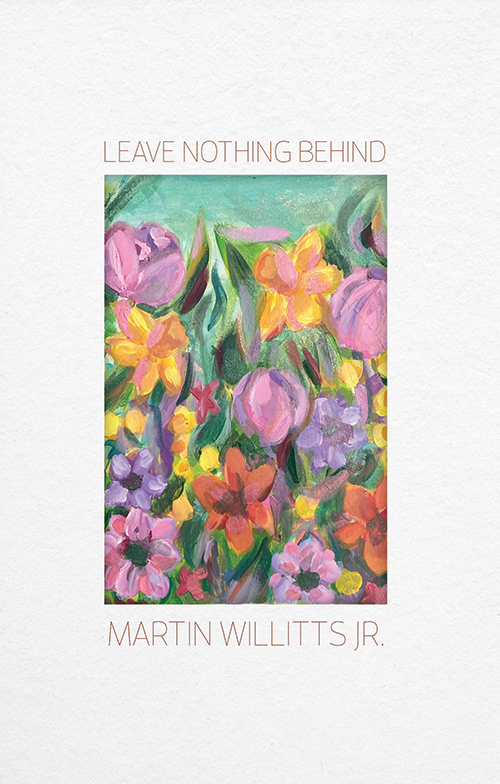
Leave Nothing Behind
Reviewed by Harvey Gillman
June 1, 2024
By Martin Willitts Jr. Fernwood Press, 2023. 106 pages. $18/paperback.
The reading of poetry is essentially an act of communion. What is being communicated is not merely a theory or a proposition about reality but a world of observation and relationship to which the reader is invited. When I began Leave Nothing Behind, I was slightly nonplussed. I did not know the poet. After reading the poems several times, I still cannot say I know him, but I can begin to look with his eyes and respond somewhat to the intimations of his soul.
I now see these poems as meditations. Each one addresses the reader, the poet himself, and the world. They are to be read slowly. They build up a picture through sense impressions; they are communions with the natural world. They offer ambiguous lessons. The title Leave Nothing Behind reflects this ambiguity: we are part of the natural world; we are constantly changing; sometimes we may feel alienated, but nothing is finally lost, though we move through pain, separation, and death itself. In “This Is How the Light Works Where It Is Darkest,” Willitts writes:
we are interconnected with everything in the universe—
each fragment, each strand of love—
so when we swim toward death.
we are never alone.
For the poet, elements of the natural world—lilies, daffodils, “dimness / or luminescence / of faint flowers,” skylark, trillium, “ravenous blue-black skies,” a mockingbird, and so much else—are his teachers, leading him through the silence to see and to feel. And he is overwhelmed by what he observes: “this inescapable realization / of entering into the marvelous.”
He is constantly surprised by the interconnection of the physical and spiritual worlds. The one betokens the other. However he is also aware throughout this journey through place and time of the passing of things, of people, and of his own mortality. There is pain as well as serenity.
Two personal poems in particular illustrate this connection: “Amazing Grace” and “The Day Is Sleeplessly Broken.” In the first of these, he writes of his Amish grandmother fearing to sing, lest she be led by the devil, but she cannot protect herself from the hidden voice within her and its overwhelming song “as if everyone needed grace.” There is an inevitability about grace and the Light as we open ourselves to experiences of depth. In “The Day Is Sleeplessly Broken,” a fresh angle emerges as the poet walks with his father through pine woods. His father is deaf, and the son helps him to make connections by using sign language. What he reveals is the music of songbirds.
In “A Single Water Drop,” he again highlights the certainty of death, an ending that progresses in every moment:
We all want to hold together,
but everyday skin cells die
and flake off,
parachuting down,
and we have no choice.
And in an earlier poem, “Final Leaf,” he links humans and trees: “Skin cells die, but so does the falling leaf,” and here is the ambiguity of the work: the sensuality of passing things, the wise lessons they offer, but which we often try to resist.
We do not recognize its fragility
Is too much like our own.
We could lay our hands on that leaf,
Just to feel it jolt out of its silent waiting.
After watching the leaf, the poet observes ruefully: “We resist the temptation / to let go.”
I later learned that Willitts served with American Friends Service Committee as a field medic in Vietnam during the war in the late 1960s; he was stationed right on the border, an experience that surely shaped his view of life. He now has over 20 full-length collections of poetry. This anthology ends with the lines: “In death / We all make our own music.”
There is indeed something very musical about this work, and painterly. It is as though language were reaching beyond itself. I would prescribe one of these poems a day followed by a walk in the woods, a park, or a garden.
Harvey Gillman is the former outreach secretary for Britain Yearly Meeting; author of books and articles; workshop facilitator; and speaker on spirituality, language, and the Quaker way. His latest work is an anthology of poetry called Epiphanies (2021). Now in his 70s, he still feels inspired to write poetry and is hoping to produce a further anthology.



Comments on Friendsjournal.org may be used in the Forum of the print magazine and may be edited for length and clarity.